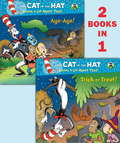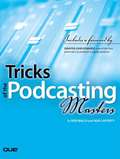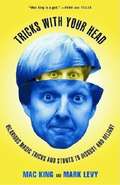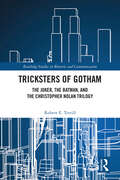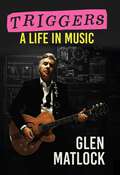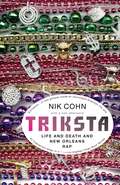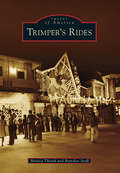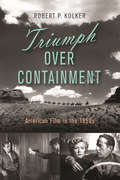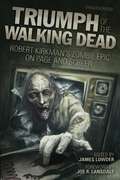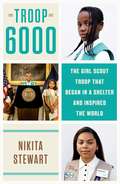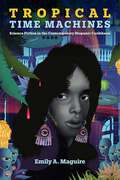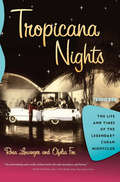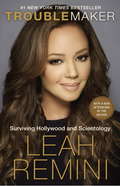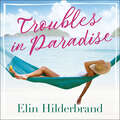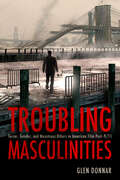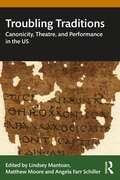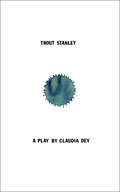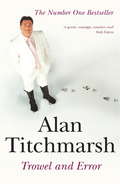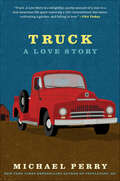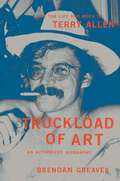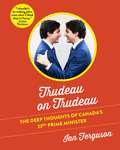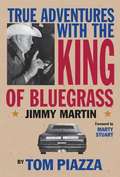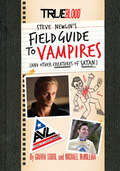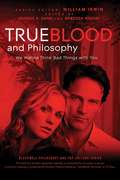- Table View
- List View
Trick-or-Treat!/Aye-Aye! (Pictureback(R))
by Joe Mathieu Tish RabeIt's no trick--fans of the PBS Kids television show The Cat in the Hat Knows a Lot About That! are in for a treat this Halloween with two holiday stories. In Trick-or-Treat!, the Cat and kids visit with a spider monkey, a coconut crab, and a fruit bat to see some amazing tricks and to sample some exotic healthy treats. And in Aye-Aye!, when Sally and Nick need help making scary Halloween masks, the Cat knows just what to do. He takes them to visit an aye-aye--a creepy-looking creature whose frightening looks are perfectly adapted for his environment. All in all, this is a Halloween treat sure to make parents, kids--and dentists--smile!
Tricks of the Podcasting Masters
by Rob Walch Mur LaffertyThis book gives detailed instructions for putting together your own podcasts. It also reviews the history of podcasting. Everything you ever wanted to know about podcasts is probably here.
Tricks with Your Head: Hilarious Magic Tricks and Stunts to Disgust and Delight
by Mac King Mark Levy"Mac King is a god. " --Penn and Teller. Tricks with Your Head is the world's greatest (and only) collection of hilarious, mystifying, and sometimes repulsive magic tricks that you can perform with your very own head. If you've only thought of your head as a receptacle for so-called higher learning, or as a structure for keeping your haircut from falling into your body cavity, rejoice! Now you can use that ten-pound meatball between your shoulders as a source of ribald entertainment. Best of all, when you learn to perform a head trick, you can never be caught without your prop. Mac King and Mark Levy have perfected the ultimate mix of head games (literally) in this clever illustrated volume that teaches you how to: * Make your head disappear * Penetrate your skull with a drinking straw * Make a french fry vanish up your nose * Read someone's mind * Jab a fork in your eye
Tricksters of Gotham: The Joker, The Batman, and The Christopher Nolan Trilogy (Routledge Studies in Rhetoric and Communication)
by Robert E. TerrillTricksters of Gotham explores the "trickster" tale through an in-depth look at Christopher Nolan’s Batman trilogy: Batman Begins, The Dark Knight, and The Dark Knight Rises.The trickster figure is an ancient and variable figure, versions of which populate the myths and folklore of many human cultures worldwide. Conceptualising the trilogy as a single aggregate text with a clear narrative arc, the author explores the variety of trickster figures present in the films and draws clear parallels with the surrounding social and political context. Departing from the central argument that the Batman trilogy shows a variety of trickster characters, even Batman himself, this book shows contemporary trickster figures to be rich and relevant cultural resources that can focus our attention on those elements of the social order that have become too rigid, hierarchical, or exclusionary. The author argues that they can model tactics for engaging with tricksters when they inevitably arise in civic culture, offering insights about how to manage interactions with these figures who can be both productively disruptive and potentially destructive. This book pays close attention to the characters portrayed in the Nolan Batman trilogy—not only the Batman and the Joker but the more minor characters as well—to discover what trickster-like tactics they may offer. In this way, the book intends to render these films as a sort of equipment for civic life and to encourage similar analyses of other contemporary cultural artifacts.Through close readings of these films, the book renders the Nolan Batman trilogy as what rhetorical theorist Kenneth Burke refers to as “equipment for living.” This book will interest scholars and students of rhetoric and public culture, film studies, and communication.
Triggers: A Life In Music
by Glen MatlockThe life and career of Sex Pistols legend Glen Matlock through the lens of thirty of his most formative songs: a one-of-a-kind insight into the ultimate icons of punk.Courting controversy wherever they went, the Sex Pistols embraced shock value and pushed boundaries, generating headlines and public outrage. Sharing insider tales of the Sex Pistols' earliest gigs and stormiest reunions, as well as their most idiosyncratic inter-band dynamics, Glen Matlock tells his story through the impact 30 songs made in his life, including how &“Starman&” by David Bowie reminded him of his love for Anthony Newley or &“Three Button Hand Me Down&” by The Faces spoke to his hardscrabble early life in London. Matlock&’s story is the pioneering story of punk rock yet, having performed and recorded with so many musical luminaries over the decades, Glen also reflects on his time with the likes of Iggy Pop, David Bowie, the Faces, Blondie, Primal Scream, and many more.
Triksta: Life and Death and New Orleans Rap
by Nik CohnWhat lunacy would cause a 55-year-old white male, neither lean nor hungry, to embroil himself in the world of New Orleans rap, not merely as an observer, but as an active participant - ideas man, talent-spotter, lyricist, and would-be producer? And why did his experience, after many tribulations, end up so profoundly joyous and fulfilling? Nik Cohn has loved (and hated) hip-hop since its birth, thirty years ago, and loved (and hated) New Orleans for even longer. The city has haunted him from childhood, an addiction he's never wanted to kick. But nothing prepared him for the experience of being pitched, more or less by accident, into the role of Triksta, rap impressario. A white alien in a black world, with no funding or qualifications, and not a clue what he was doing, he had to rethink himself from scratch. Surrounded by a cast-list that included such names as Choppa and Soulja Slim, Big Ramp and Lil T, Bass Heavy, Fifth Ward Weebie, and Shorty Brown Hustle, he entered a world of tiny backstreet studios, broken-down slums and gun turfs, almost unimaginable to those who know New Orleans only as the touristic Big Easy. Triksta is the story of a three-year odyssey that became all-consuming - a journey to the heart of rap, and New Orleans, and self-knowledge. Hilarious, tragic, startling, and exhilarating, sometimes all at once, it is Nik Cohn's greatest book.
Trimper's Rides
by Brandon Seidl Monica ThrashNo trip to Ocean City, Maryland, is complete without a visit to Trimper's Rides. The unforgettable bright lights, carousel music, and elated screams from riders on the Tidal Wave are cherished memories for generations who return to the park annually. The evolution and success of Trimper's Rides embodies the American dream. It began when an enterprising German immigrant named Daniel B. Trimper and his large family took a chance on a little-known seaside town. They built a top-notch family-entertainment experience that continues to delight visitors today. The Trimpers rebuilt after storms, endured wartime challenges, and experienced periods of rapid growth and prosperity. Trimper's Rides chronicles this journey with nostalgic images of past attractions and the people who made Trimper's Rides the destination for family fun.
Triumph Over Containment: American Film in the 1950s
by Robert P. KolkerThe long 1950s, which extend back to the early postwar period and forward into the early 1960s, were a period of “containment culture” in America, as the media worked to reinforce traditional family values and suspected communist sympathizers were blacklisted from the entertainment industry. Yet some brave filmmakers and actors still challenged the status quo to produce indelible and imaginative work that delivered uncomfortable truths to Cold War audiences. Triumph Over Containment offers an uncompromising look at some of the era’s greatest films and directors, from household names like Alfred Hitchcock and Stanley Kubrick to lesser-known iconoclasts like Samuel Fuller and Ida Lupino. Taking in everything from The Thing from Another World (1951) to Dr. Strangelove or: How I Learned to Stop Worrying and Love the Bomb (1964), acclaimed film scholar Robert P. Kolker scours a variety of different genres to find pockets of resistance to the repressive and oppressive norms of Cold War culture. He devotes special attention to two quintessential 1950s genres—the melodrama and the science fiction film—that might seem like polar opposites, but each offered pointed responses to containment culture. This book takes a fresh look at such directors as Nicholas Ray, John Ford, and Orson Welles, while giving readers a new appreciation for the depth and artistry of 1950s Hollywood films.
Triumph of The Walking Dead: Robert Kirkman's Zombie Epic on Page and Screen
by Jay BonansingaAll zombies are created equal. All zombie stories are not. From its humble beginnings as an indie comic book, The Walking Dead has become a pop culture juggernaut boasting New York Times–bestselling trade paperbacks, a hit television series, and enough fans to successfully take on any zombie uprising. Triumph of The Walking Dead explores the intriguing characters, stunning plot twists, and spectacular violence that make Robert Kirkman's epic the most famous work of the Zombie Renaissance. The Walking Dead novels' co-author Jay Bonansinga provides the inside story on translating the comics into prose; New York Times bestseller Jonathan Maberry takes on the notion of leadership (especially Rick Grimes') during the zombie apocalypse; Harvard professor Steven Schlozman dissects the disturbing role of science in the television series; and more. Triumph of The Walking Dead features a foreword by horror legend Joe R. Lansdale.
Troop 6000: How a Group of Homeless Girl Scouts Inspired the World
by Nikita StewartThe extraordinary true story of the first Girl Scout troop designated for homeless girls - from the homeless families it brought together in Queens, New York, to the amazing citywide and countrywide responses it sparked.Giselle Burgess, a young mother of five, and her children, along with others in the shelter, become the catalyst for Troop 6000. Having worked for the Girl Scouts earlier on, Giselle knew that these girls, including her own daughters, needed something they could be a part of, where they didn't need to feel the shame or stigma of being homeless, but could instead develop skills and build a community that they could be proud of.New York Times journalist Nikita Stewart embedded with Troop 6000 for more than a year, at the peak of New York City's homelessness crisis in 2017, spending time with the girls and their families and witnessing both their triumphs and challenges. Stewart takes the reader with her as she paints intimate portraits of Giselle's family and the others whom she met along the way. Readers will feel an instant connection and express joy when a family finally moves out of the shelter and into a permanent home, as well as the pain of the day-to-day life of homelessness. And they will cheer when the girls sell their very first cookies.Ultimately, Troop 6000 puts a different face on homelessness. Stewart shows how shared experiences of poverty and hardship sparked the political will needed to create the troop that would expand from one shelter to fifteen in New York City and ultimately to other cities around the country. Also woven throughout the book is a history of the Girl Scouts, and how the organization has changed and adapted to fit the times, meeting the needs of girls from all walks of life.Troop 6000 is the ultimate story of how when we come together, we can improve our circumstances, find support and commonality, and experience joy, no matter how challenging life may be.
Tropical Time Machines: Science Fiction in the Contemporary Hispanic Caribbean (Reframing Media, Technology, and Culture in Latin/o America)
by Emily A. MaguireHow writers and artists use science fiction to speak to the current moment in the Caribbean Exploring the remarkable recent increase in works of science fiction originating in Spanish-speaking parts of the Caribbean and their diasporas, Tropical Time Machines shows how writers, filmmakers, musicians, and artists are using the language of the genre to comment on the region’s history and present-day realities. Discussing how previous Caribbean literature and film has characterized places including Cuba, Puerto Rico, and the Dominican Republic as “out of sync” with Western time, occupying a repeating or static space, Emily Maguire argues that science fiction breaks these cycles and resituates the region temporally and spatially. In chapters on cyberpunk, zombies, post-apocalyptic narratives, and the ab-real, Maguire shows how recent cultural production analyzes and critiques the ways globalization and national leadership have reinforced the region’s marginalization amid economic and climate crises. Art that employs the science fictional mode makes room for a new vision of the Caribbean, Maguire demonstrates—an alternate perspective in which the region has agency in shaping its own narratives and trajectories. The texts themselves are time machines, enabling creators to protest inequalities of the present from the point of view of an imagined, transformed future. A volume in the series Reframing Media, Technology, and Culture in Latin/o America, edited by Héctor Fernández L’Hoeste and Juan Carlos Rodríguez Publication of this work made possible by a Sustaining the Humanities through the American Rescue Plan grant from the National Endowment for the Humanities.
Tropicana Nights
by Rosa Lowinger Ofelia FoxAt Tropicana you could play the roulette wheel, dance to the latest mambo or rumba, or simply ogle the parading goddesses of the flesh. It was the brightest jewel in 1950s Cuban nightlife, and Nat "King" Cole, Liberace, Josephine Baker, and Carmen Miranda performed there before audiences that included Ernest Hemingway, Marlon Brando, and Joan Crawford. In Tropicana Nights, Rosa Lowinger and Ofelia Fox, widow of Martin Fox, the club's last owner, take us back to its glory years. Ofelia, the "first lady" of Tropicana, shares her memories, undimmed by decades of exile, with Rosa Lowinger, also a Cuban exile, whose parents frequented the club in its heyday. Together, Lowinger and Fox vividly portray the cultural richness and roiling social problems of pre-Revolutionary Cuba and take the reader on a tour of one of the world's most glamorous venues at its most brilliant moment.
Troublemaker: Surviving Hollywood And Scientology
by Rebecca Paley Leah ReminiThe outspoken actress, talk show host, and reality television star offers up a no-holds-barred memoir, including an eye-opening insider account of her tumultuous and heart-wrenching thirty-year-plus association with the Church of Scientology. Leah Remini has never been the type to hold her tongue. That willingness to speak her mind, stand her ground, and rattle the occasional cage has enabled this tough-talking girl from Brooklyn to forge an enduring and successful career in Hollywood. But being a troublemaker has come at a cost. That was never more evident than in 2013, when Remini loudly and publicly broke with the Church of Scientology. Now, in this frank, funny, poignant memoir, the former King of Queens star opens up about that experience for the first time, revealing the in-depth details of her painful split with the church and its controversial practices. Indoctrinated into the church as a child while living with her mother and sister in New York, Remini eventually moved to Los Angeles, where her dreams of becoming an actress and advancing Scientology's causes grew increasingly intertwined. As an adult, she found the success she'd worked so hard for, and with it a prominent place in the hierarchy of celebrity Scientologists alongside people such as Tom Cruise, Scientology's most high-profile adherent. Remini spent time directly with Cruise and was included among the guests at his 2006 wedding to Katie Holmes. But when she began to raise questions about some of the church's actions, she found herself a target. In the end, she was declared by the church to be a threat to their organization and therefore a "Suppressive Person," and as a result, all of her fellow parishioners--including members of her own family--were told to disconnect from her. Forever. Bold, brash, and bravely confessional, Troublemaker chronicles Leah Remini's remarkable journey toward emotional and spiritual freedom, both for herself and for her family. This is a memoir designed to reveal the hard-won truths of a life lived honestly--from an author unafraid of the consequences.
Troubles in Paradise: Book 3 in NYT-bestselling author Elin Hilderbrand's fabulous Paradise series (Winter in Paradise)
by Elin HilderbrandEscape to the bright Caribbean sunshine one last time in this satisfying and page-turning conclusion to the bestselling Paradise trilogy.After uprooting her life, Irene Steele has just settled in at the villa on St. John where her husband Russ had been living a double life. But a visit from the FBI shakes her foundations, and Irene once again learns just how little she knew about the man she loved. Irene and her sons try to get on with setting up their new lives while evidence mounts that the helicopter crash that killed Russ may not have been an accident. Meanwhile, the island watches this drama unfold - including the driver of a Jeep with tinted windows who seems to be shadowing the Steele family. As a storm gathers strength in the Atlantic, surprises are in store for the Steeles: help from a mysterious source, and a new beginning in the paradise that has become their home. At last all will be revealed about the secrets and lies that brought Irene and her sons to St. John - and the truth that transformed them all.Praise for WINTER IN PARADISE 'What do you do once you've become queen of the Summer novel and mastered the art of the Christmas novel? You start a new series, of course! This Fall, the incomparable Elin Hilderbrand brings us to St. John for the first novel in her new The Paradise series... Another compulsively readable hit by Hilderbrand.' - PopSugar'A new series from Nantucket author Elin Hilderbrant-that's set in St. John!' - Modern Mrs. Darcy'With great verve, [Hilderbrand] has done it again with her latest novel, WINTER IN PARADISE, the first book in a planned trilogy. She is witty and engaging, and keeps her readers intrigued with a memorable set of characters... As always, she delivers a story with much detail, weaving her characters and storylines expertly... Be prepared to read a fast-paced and entertaining novel for several hours, which will keep you longing for the second book in the series.' - Bookreporter'The perfect vacation read.' - Hasty Book List'As she does in her books set on Nantucket, Hilderbrand excels at establishing a setting (the food! the luxury! the sea turtles!) that will inspire wanderlust...Hilderbrand is the queen of the summer blockbuster; her fans will be thrilled that she's looking to take on winter.' - Booklist'This fast-paced novel offers the voices of several different characters, as well as a hefty load of intrigue.' - New York journal of Books(P) 2020 Hodder & Stoughton Ltd
Troubling Masculinities: Terror, Gender, and Monstrous Others in American Film Post-9/11
by Glen DonnarTroubling Masculinities: Terror, Gender, and Monstrous Others in American Film Post-9/11 is the first multigenre study of representations of masculinity following the emergence of violent terror as a plot element in American cinema after September 11, 2001. Across a broad range of subgenres—including disaster melodrama, monster movies, postapocalyptic science fiction, discovered footage and home invasion horror, action-thrillers, and frontier westerns—author Glen Donnar examines the impact of “terror-Others,” from Arab terrorists to giant monsters, especially in relation to cinematic representations in earlier periods of national turmoil. Donnar demonstrates that the reassertion of masculinity and American national identity in post-9/11 cinema repeatedly unravels across genres. Taking up critical arguments about Hollywood’s attempts to resolve male crisis through Orientalizing figures of terror, he shows how this failure reflects an inability to effectively extinguish the threat or frightening difference of terror. The heroes in these movies are unable to heal themselves or restore order, often becoming as destructive as the threats they are supposed to be fighting. Donnar concludes that interrelated anxieties about masculinity and nationhood continue to affect contemporary American cinema and politics. By showing how persistent these cultural fears are, the volume offers an important counternarrative to this supposedly unprecedented moment in American history.
Troubling Traditions: Canonicity, Theatre, and Performance in the US
by Lindsey MantoanTroubling Traditions takes up a 21st century, field-specific conversation between scholars, educators, and artists from varying generational, geographical, and identity positions that speak to the wide array of debates around dramatic canons. Unlike Literature and other fields in the humanities, Theatre and Performance Studies has not yet fully grappled with the problems of its canon. Troubling Traditions stages that conversation in relation to the canon in the United States. It investigates the possibilities for multiplying canons, methodologies for challenging canon formation, and the role of adaptation and practice in rethinking the field’s relation to established texts. The conversations put forward by this book on the canon interrogate the field’s fundamental values, and ask how to expand the voices, forms, and bodies that constitute this discipline. This is a vital text for anyone considering the role, construction, and impact of canons in the US and beyond.
Trout Stanley
by Claudia DeyDescribed by Variety as 'Yukon Gothic,' Claudia Dey's acclaimed Trout Stanley is set in northern British Columbia, on the outskirts of a mining town between Misery Junction and Grizzly Alley. In this inhospitable setting live a pair of sisters, twins who are not identical in any way: Sugar, a complicated, insecure waif who still wears the tracksuit her mother died in ten years prior, and Grace, a rough-and-tumble hellcat who owns the local dump. At the play's opening, it is their thirtieth birthday, and the TV news has announced the disappearance of a local Scrabble-champ stripper. While Grace is at the dump, housebound Sugar is surprised by a mysterious drifter, one Trout Stanley, foot fetishist and fake cop, who is searching for the lake where his parents drowned - a fishy story if there ever was one. He quickly becomes mired in a surreal love triangle with the two sisters.Trout Stanley is about three people who confuse codependence for co-operation and afliction for affection. An eccentric, captivating story in which the biggest catch of all is love. Lavishly illustrated by Jason Logan. 'Trout Stanley stands out from the crowd ... Dey, whose language has always been striking and whose dramaturgy has sharpened with every play she's written, here delivers a masterwork.' - The National Post
Trowel and Error
by Alan TitchmarshAlan Titchmarsh has had a passion for gardening for as long as he can remember. Aged 8, he announced to friends that he was going to be the next Percy Thrower, although he thought it was no more than a dream.With the magic touch of a best-selling writer, Alan tells his own story from Ilkley Moor to Pebble Mill and to the final realising of his dream of becoming TV's favourite gardener. Along the way, the cast of characters includes everyone from Auntie Ethel to Nelson Mandela and the Queen.With great charm, humour and passion, this is probably the best story Alan Titchmarsh has ever told.
Truck Tunes: 45 Truck Songs to Sing Aloud Together
by Jim Gardner Rob GardnerFrom the creators of the popular Truck Tunes and Twenty Trucks songs comes a bright, fun singalong book celebrating kids' favorite trucks! Sing and dance your way into the world of trucks with this collection of 45 catchy, fun, and educational truck songs accompanied by photographs of real trucks in action. From the creators of Twenty Trucks and Truck Tunes comes the first-ever book with this brand. From timeless classics such as dump trucks, fire trucks, excavators, and cement mixers to the not-so-known but equally amazing concrete boom pumps, delimbers, vacuum trucks, and more, this is the must-have book for the truck-loving toddler and young child in any family.
Truck: A Love Story
by Michael PerryA part-time emergency medical technician humorously chronicles life in a small Wisconsin town, featuring tales of romance and auto repair.Hilarious and heartfelt, Truck: A Love Story is the tale of a man struggling to grow his own garden, fix his old pickup, and resurrect a love life permanently impaired by Neil Diamond. In the process, he sets his hair on fire, is attacked by wild turkeys, and proposes marriage to a woman in New Orleans. The result is a surprisingly tender testament to love.Praise for Truck“A touching and very funny account. . . . Thoroughly engaging.” —New York Times“Part Bill Bryson, part Anne Lamott, with a skim of Larry the Cable Guy and Walt Whitman creeping around the edges.” —Lincoln Journal Star“Perry takes each moment, peeling it, seasoning it with rich language, and then serving it to us piping hot and fresh.” —Chicago Tribune“A reminder, by a talent of the hinterlands, to celebrate small-town life and to treasure human relationships.” —Kirkus Reviews
Truckload of Art: The Life and Work of Terry Allen—An Authorized Biography
by Brendan GreavesThe definitive, authorized, and first-ever biography of Terry Allen, the internationally acclaimed visual artist and iconoclastic songwriter who occupies an utterly unique position straddling the disparate, and usually distant, worlds of conceptual art and country music. &“People tell me it&’s country music,&” Terry Allen has joked, &“and I ask, &‘Which country?&’&” For nearly sixty years, Allen&’s inimitable art has explored the borderlands of memory, crossing boundaries between disciplines and audiences by conjuring indelible stories out of the howling West Texas wind. In Truckload of Art, author Brendan Greaves exhaustively traces the influences that shaped Allen&’s extraordinary life, from his childhood in Lubbock, Texas, spent ringside and sidestage at the wrestling matches and concerts his father promoted, to his formative art-school years in incendiary 1960s Los Angeles, and through subsequent decades doggedly pursuing his uncompromising artistic vision. With humor and critical acumen, Greaves deftly recounts how Allen built a career and cult following with pioneering independent records like Lubbock (on everything) (1979)—widely considered an archetype of alternative country—and multiyear, multimedia bodies of richly narrative, interconnected art and theatrical works, including JUAREZ (ongoing since 1968), hailed as among the most significant statements in the history of American vernacular music and conceptual art. Drawing on hundreds of revealing interviews with Allen himself, his family members, and his many notable friends, colleagues, and collaborators—from musicians like David Byrne and Kurt Vile to artists such as Bruce Nauman and Kiki Smith—and informed by unprecedented access to the artist&’s home, studio, journals, and archives, Greaves offers a poetic, deeply personal portrait of arguably the most singularly multivalent storyteller of the American West.
Trudeau on Trudeau: The Deep Thoughts of Canada's 23rd Prime Minister
by Ian FergusonA satirical journey through the mind of the part-time snowboarding instructor and drama teacher who is the prime minister of Canada.Trudeau on Trudeau is a book like no other. It’s a collection of real words spoken by Prime Minister Justin Trudeau that paints a portrait of a man who hasn’t quite gotten the hang of leading Canada. Included are familiar quotes, such as “The budget will balance itself”; the infamous “You are a piece of sh*t”; and the plain pathetic “We will grow the economy from the heart out”; and many, many more. Full of real photos of Justin taking selfies, quizzes, a photo album of Justin’s taxpayer-funded vacation in India, and laugh-out-loud commentary, Trudeau on Trudeau is sure to answer the question, “What happens when a part-time snowboarder and drama teacher becomes prime minister of Canada?” Trudeau on Trudeau is a must-have, not just for political junkies, but for any and all Canadians who care about the future of our country.
True Adventures With the King of Bluegrass
by Tom PiazzaPiazza found himself pitched headlong into a world he couldn't have anticipated. Martins mercurial personality drew the writer into a series of escalating encounters (with mean dogs, broken-down cars, and near electrocution), culminating in a harrowing and unforgettable expedition, with Martin, to the Grand Ole Opry. Piazza captured his visit with Martin in supple, electric prose, and the result, when it appeared in The Oxford American, quickly became a word-of-mouth sensation among musicians and fans alike. Some explicit language.
True Blood (And Other Creatures of Satan): A Field Guide to Vampires
by Gianna Sobol Michael McMillianA hilarious handbook by Bon Temps&’s famed anti-vampire activist—with photos, letters, and some snark in the margins from Pam and Eric . . . The vampires, werewolves, faeries, and other supernatural creatures that call Bon Temps, Louisiana home aren&’t universally accepted around town—and sweet-talking, bible-thumping Steve Newlin is their self-appointed nemesis. In his demented field guide, Steve has recorded all he knows about these Creatures of Satan, and that&’s a lot: their strengths, their weaknesses, their bylaws, and, of course, how to kill them. Sadly for Steve—but luckily for True Blood fans everywhere—his journal was stolen by Fangtasia vampires Pam and Eric, who have defaced it in a most disrespectful and snarky manner. From an associate producer of the show and the actor who played Steve, Steve Newlin&’s Field Guide to Vampires is packed with untold insight into these compelling characters, along with photos, letters, postcards, handwritten notes, and Steve&’s own idle doodles, perfectly capturing the tongue-in-cheek camp that made True Blood a major HBO hit and a genuine TV classic.
True Blood and Philosophy: We Wanna Think Bad Things with You
by Rebecca Housel George A. DunnTrue Blood and Philosophy calls on the minds of some of history's great thinkers to perform some philosophical bloodletting on this thought-provoking series.
